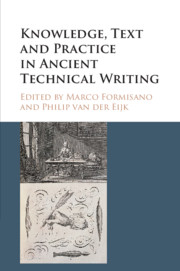Book contents
- Knowledge, text and practice in ancient technical writing
- Knowledge, text and practice in ancient technical writing
- Copyright page
- Contents
- Illustrations
- Contributors
- Acknowledgements
- Abbreviations
- Chapter 1 Introduction
- Chapter 2 Introduction
- Chapter 3 Machines on Paper
- Chapter 4 Si qui voluerit
- Chapter 5 Caesar's Rhine Bridge and Its Feasibility in Giovanni Giocondo's Expositio pontis (1513)
- Chapter 6 From Words to Acts?
- Chapter 7 Naso magister erat – sed cui bono?
- Chapter 8 From technē to kakotechnia
- Chapter 9 From Discourses to Handbook
- Chapter 10 The Problem of Practical Applicability in Ptolemy´s Geography
- Chapter 11 Living According to the Seasons
- Chapter 12 Auctoritas in the Garden
- Chapter 13 The Generous Text
- Chapter 14 From Descriptions to Acts
- Index Locorum
- General Index
- References
Chapter 7 - Naso magister erat – sed cui bono?
On Not Taking the Poet's Teaching Seriously
Published online by Cambridge University Press: 27 April 2017
- Knowledge, text and practice in ancient technical writing
- Knowledge, text and practice in ancient technical writing
- Copyright page
- Contents
- Illustrations
- Contributors
- Acknowledgements
- Abbreviations
- Chapter 1 Introduction
- Chapter 2 Introduction
- Chapter 3 Machines on Paper
- Chapter 4 Si qui voluerit
- Chapter 5 Caesar's Rhine Bridge and Its Feasibility in Giovanni Giocondo's Expositio pontis (1513)
- Chapter 6 From Words to Acts?
- Chapter 7 Naso magister erat – sed cui bono?
- Chapter 8 From technē to kakotechnia
- Chapter 9 From Discourses to Handbook
- Chapter 10 The Problem of Practical Applicability in Ptolemy´s Geography
- Chapter 11 Living According to the Seasons
- Chapter 12 Auctoritas in the Garden
- Chapter 13 The Generous Text
- Chapter 14 From Descriptions to Acts
- Index Locorum
- General Index
- References
- Type
- Chapter
- Information
- Knowledge, Text and Practice in Ancient Technical Writing , pp. 112 - 137Publisher: Cambridge University PressPrint publication year: 2017
References
- 1
- Cited by



